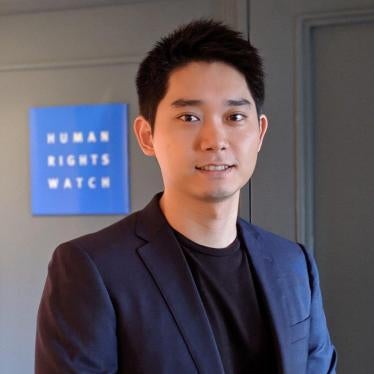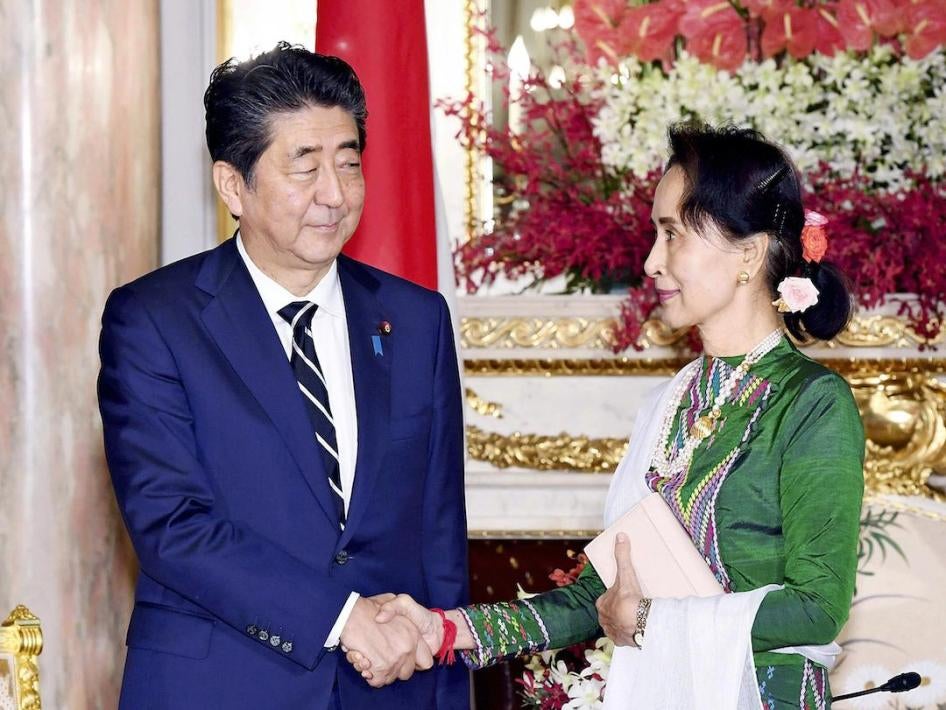Drowned out by the noise of the Rugby World Cup and overshadowed by the deadly devastation wrought by Typhoon Hagibis was a meeting between Japan’s leaders and an alleged war criminal, which went largely unreported by the media and unnoticed by the public.
Myanmar military commander-in-chief Senior General Min Aung Hlaing – whom a United Nations-backed fact-finding mission found should be “investigated and prosecuted” for war crimes, crimes against humanity, and genocide against the Rohingya Muslim minority in Rakhine state – visited Tokyo this month at the invitation of Japan’s Defense Ministry. There he met with government ministers, including Prime Minister Shinzo Abe.
Abe reportedly told Min Aung Hlaing that the Myanmar military should address the allegations of human-rights violations in Rakhine state by implementing proposals from the government-created Independent Commission of Enquiry. Abe apparently did not mention ongoing efforts by the UN and concerned governments to carry out a genuinely independent and impartial investigation into the atrocities, according to a Defense Ministry press release.
Japan’s diplomatic embrace of Min Aung Hlaing, who was sanctioned by the US in July for the extrajudicial killings of Rohingya, is Tokyo’s latest betrayal of its human-rights values as its diplomacy remains focused on fending off China while seeking economic opportunities in Myanmar and beyond.
In August 2017, Min Aung Hlaing deployed two notoriously abusive military units to Rakhine state, where they led a large-scale campaign of ethnic cleansing that drove more than 740,000 Rohingya out of Myanmar. As of today, nearly a million Rohingya live in overcrowded, flood-prone refugee camps in Bangladesh, while another 600,000 in Myanmar are confined to camps and villages under guard of local authorities and security forces who deny them freedom of movement and other basic rights.
Last year, the UN-backed Fact-Finding Mission on Myanmar found that the violence inflicted by the military on the Rohingya population was carried out under direct orders from Min Aung Hlaing. In reaching the broader conclusion of genocidal intent, the fact-finding mission analyzed Min Aung Hlaing’s statements and social-media posts – such as his declaration to “solve” the country’s “Bengali problem” – and found that they revealed “a disturbingly discriminatory understanding of the role of the Myanmar security forces and a flagrant disregard for one of the core principles of international human rights law, non-discrimination and equal protection.”
Further credible evidence of the Myanmar military’s atrocities against the Rohingya has been amassed by independent human-rights organizations and the media. The Japanese government, however, remains uncooperative to any international effort to hold those responsible for grave crimes in Myanmar, and has been particularly hesitant to support the UN’s new Independent Investigative Mechanism for Myanmar.
At the recent session of the UN Human Rights Council in Geneva, Japan once again abstained from voting on a resolution on Myanmar, prompting Myanmar’s ambassador to Japan, Myint Thu, to thank Japan for its abstention.
Japan’s willingness to overlook Min Aung Hlaing’s sordid record reflects Tokyo’s much larger betrayal of its democratic values in foreign policy. Competing with China for the good graces of even the worst human-rights abusers seems to be Japan’s strategy. Tokyo also has ambitions of reaping economic benefits through investments in Myanmar by ignoring the Rohingya crisis. Since July, four investment forums specifically geared toward business opportunities in Myanmar were held in Japan, all organized or sponsored by the Japan External Trade Organization (JETRO).
At the most recent forum in Tokyo on Monday, Myanmar’s de facto leader, Aung San Suu Kyi, received a big round of applause as she entered the ceremony hall.
“We sincerely hope that we can continue to receive the support and understanding of our friends from around the world, including Japan,” the Nobel Peace Prize laureate told several hundred investors and businesspeople. She never mentioned the plight of the Rohingya in refugee camps or those locked down in Rakhine state.
Earlier this year, in anticipation of renewing its seat at the UN Human Rights Council, Japan stated that it “firmly believes that the promotion and protection of all human rights is a legitimate interest of the international community... Therefore, grave violations of human rights need to be addressed in cooperation with the international community.”
In the short term, enabling Japanese companies and investors to dive into the Southeast Asian market while ignoring human rights may appear beneficial in competing with China. In the long term, however, this will only encourage rights-abusing governments to resist democratic reforms, perpetuating human-rights abuses across the region.
So far, Japan’s commitment to human rights in its foreign policy has proved farcical, but it can get back on track by pursuing justice for the Rohingya by supporting the new UN investigative mechanism. Japan should start voting in favor of Myanmar-related resolutions at the UN, such as at the upcoming General Assembly Third Committee session in November.
The Japanese government should never again welcome to Tokyo a military leader who oversaw the murder, rape, and mass deportation of an ethnic minority. Min Aung Hlaing belongs before an international criminal court, facing justice for his actions against the Rohingya – not feted by Japan’s leaders.










